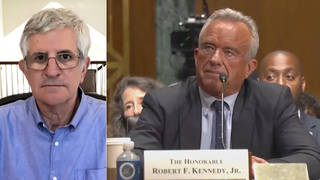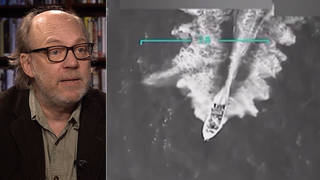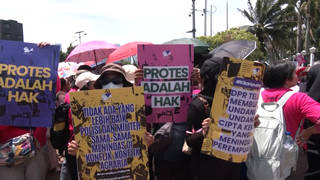
Guests
- Nina Lakhanifreelance journalist.
Watch Part 2 of our discussion with the reporter behind a new investigation that reveals further ties between the killing of renowned environmental activist Berta Cáceres, Honduran military intelligence and the United States. Cáceres was assassinated one year ago in her home in La Esperanza, Honduras, just before midnight on March 2, 2016. She was the co-founder of COPINH, the Civic Council of Popular and Indigenous Organizations of Honduras. In 2015, she won the prestigious Goldman Environmental Prize for her decade-long fight against the Agua Zarca Dam, a project planned along a river sacred to the indigenous Lenca people. Eight men have been arrested as suspects in Cáceres’s killing—including one active army major and two retired military members. Two of these suspects reportedly received military training in the United States. We are joined by Nina Lakhani, a freelance journalist who has been based in Mexico and Central America for the last four years. Her recent piece for The Guardian is “Berta Cáceres court papers show murder suspects’ links to US-trained elite troops.”
See Part 1 of this interview: Revealed–Environmental Activist Berta Cáceres’ Suspected Killers Received U.S. Military Training
Transcript
AMY GOODMAN: This is Democracy Now!, democracynow.org, The War and Peace Report. I’m Amy Goodman, with Part 2 of our report on this first anniversary of the assassination of the renowned Honduran environmental activist Berta Cáceres, killed in her home in La Esperanza just before midnight, March 2nd, 2016. Berta was co-founder of COPINH, the Civic Council of Popular Indigenous Organizations of Honduras. In 2015, she won the prestigious Goldman Environmental Prize for her decade-long fight against the Agua Zarca Dam, a project planned along a river sacred to the indigenous Lenca people.
Well, a new investigation has just come out in The Guardian newspaper that reveals further ties between Berta Cáceres’s assassins, the Honduran military intelligence, as well as the United States, a U.S.-trained elite force. Our guest right now is Nina Lakhani. She’s the freelance journalist who wrote the piece in The Guardian, which is headlined “Berta Cáceres court papers show murder suspects’ links to US-trained elite troops.” And she has been reporting on Honduras for years.
Nina, thanks for joining us for Part 2 of this discussion. You are highlighting this links to U.S.-trained elite troops in Honduras. We ended Part 1 by talking about why the Honduran government would want Berta Cáceres dead, the leading environmentalist of Honduras, well known also throughout the world. If you could pick it up from there?
NINA LAKHANI: Sure. I mean, Berta was a major problem for the state. You know, she wasn’t going away. She had got—you know, she had not just national, but international, attention for her campaign. You mentioned that she won the Goldman Prize, but she—you know, she’d become a celebrated activist, you know, not just in the Americas, but in Europe, all over the world.
And we now know that DESA, the company that has a concession to build the dam, hydroelectric dam—we now know that there are military, political and business elites who sit on that board. You know, the president of DESA is an ex-military intelligence officer and worked for the state electricity company. The vice president is an ex-justice minister. Another of the directors is, you know, the owner of one of the Honduras’s national banks. You know, and we now—really what we know from all the extractive industries in Honduras, that there is a revolving door of business, political and military elites, who have money, who have interests in these really environmentally destructive projects.
And she was a problem. She wasn’t going away. You know, her campaign had got huge attention internationally. And so, you know, she—that would be—that would be the reason. But I don’t think, like I said earlier, is that—you know, killing Berta, it’s highly improbable it would be the idea or would be planned by anyone at a low level. You know, we have two people connected with the company currently accused: Bustillo, who was head of security until 2015, and Sergio Rodríguez, who was a mid-ranking—he was an engineer, mid-ranking—he was the communications and environmental manager, you know, but who had nothing personally to gain. You know, he doesn’t have any—neither of them have financial interests in the company. So, that they would kill—you know, organize and kill Berta in what is probably the highest-profile murder to take place in Honduras in years, you know, it’s just, to me, highly improbable.
AMY GOODMAN: So how is the investigation of Berta Cáceres’s assassination going right now in Honduras? I mean, you have how many people arrested? Eight.
NINA LAKHANI: Eight men arrested, you know, like I say, three with military ties, two tied to the companies, and then—you know, two with ties to the company. And then we have four who were—you know, I think prosecutors believe were hit men, you know, who were low-level criminals working and were hired to do that. I mean, I think, you know, there’s no doubt that some, at least, of the material authors are among that group who’ve been arrested, you know, but I think the family are very concerned about procedural sort of errors and procedural sort of inaccuracies or things that haven’t quite been right with the investigation. They have not been given the information that they should be given, that even some of the—you know, they fear that even some of the material authors are likely to escape justice, that they haven’t all been arrested, or, you know, that they may—the case may not stand up in court against some of them.
But I don’t see any evidence—I haven’t seen any evidence thus far that there’s a strategy by prosecutors to look for the intellectual authors. You know, phone records show that there was a hit being planned. It’s likely that a hit was being planned. There’s phone records—messages between the three ex—current and ex-military officers. But where was that money coming from? Whose idea was this, you know? There doesn’t seem to be a strategy to look higher up. Who were the intellectual authors of this murder? You know, where does the evidence take us? Because the eight men who are currently in jail, I don’t think there’s evidence that—any evidence that suggests that the assassination and attempted murder of Gustavo Castro was planned by them.
AMY GOODMAN: The legislation that’s been reintroduced by Congressman Johnson to cut U.S. military aid to Honduras, what effect would that have?
NINA LAKHANI: I mean, it’s difficult to know this. There’s so much secrecy about where—what aid is spent on. You know, I mean, I think—I think last year Congress approved $18—$17 or $18 million for police and military aid. You know, it’s difficult to know what effect it would have, because I’m just not exactly sure on what the money is spent. For example, the special forces training that takes place or the support that the U.S. gives for special forces training, it’s just there’s no information. It’s classified. You know, there’s no public information about how that money is spent, who the money is spent on, what units, what exactly it goes to. So I think it’s hard to know. I think, you know, the—certainly, the U.S. Embassy in Honduras would say that, you know, what they’re trying to do in support at the moment is the purging of the police, which has been, you know, for years, linked to horrendous human rights violations, and they’re working hard on that. You know, to withdraw it completely—Honduras is a—you know, it feels and smells like a militarized state. And every year I go back, it feels more like that. You know, so, how much—how much $18 million or extra money that we don’t know about would make on that, I’m not really sure. You know, I mean, I think the argument from the U.S.—
AMY GOODMAN: Finally, the issue of the number of environmental activists who have been killed—
NINA LAKHANI: Yes.
AMY GOODMAN: —in this last year in Honduras, what do you know about this, Nina?
NINA LAKHANI: Yes. Since Berta was murdered a year ago, at least seven other activists and land—just specifically land and environment activists have been murdered. We know that. You know, a few days after she was killed, one of her COPINH colleagues, Nelson García, was murdered. Other campesino leaders have been murdered. But seven that we are absolutely sure have been, you know, who were campaigners, activists, working in the same area as Berta. So that’s 124 that we know of since the 2009 military-backed coup. That’s—I mean, it’s just—you know, it’s an incredible number. You know, her murder has not stopped—the outrage and condemnation that followed her murder has not stopped the killing, because impunity reigns.
AMY GOODMAN: And finally, when you look at the links to this U.S.-trained elite force in Honduras—
NINA LAKHANI: Yes.
AMY GOODMAN: —what do you think the U.S. has to account for now in its relationship with Honduras, even going back to her assassination, as you were the one who exposed the—
NINA LAKHANI: Yeah.
AMY GOODMAN: —the kill list with her at the top?
NINA LAKHANI: Yeah. My—the army deserter who is—you know, who I’ve been working with, is absolutely adamant that on two specialist training courses, which sound horrendous, you know, really tough training courses where he reports being tortured, suffering—you know, he was hospitalized, I think, three times during those or after those training courses, that there were American trainers present, you know, that they would train the trainers almost. You know, there were American, Colombian, Panamanian trainers present in those training courses. And he was part of an elite force, you know? And I think, just generally, in terms of the special forces, I think, yes, you know, conditionality and having checks and balances in place regarding who gets training, it’s a much wider—it’s a bigger problem than that. You know, these are systematic allegations of human rights violations against security forces in Honduras. Major Díaz has an absolutely pristine military record. There is nothing on his military record, you know, which would make him perfectly eligible for U.S. training. And yet, at the time of Berta’s murder, he was studying to become a lieutenant colonel at the same time that he was being investigated for drug trafficking and kidnap. You know, the system isn’t working. Whatever checks and balances are in place just isn’t working. You know, it’s a bigger—it’s a systematic problem of human rights violations and extrajudicial killings. You know, all really serious crimes are—there is a systematic problem in the security forces, in the army and in the police in Honduras. And I think trying to weed out bad apples is not effective. It doesn’t work. These checks and balances are not working.
AMY GOODMAN: Well, Nina Lakhani, we want to thank you for being with us. We’re going to end with the words of Berta Cáceres herself. Berta Cáceres, the leading environmental activist in Honduras, killed, assassinated a year ago.
BERTA CÁCERES: [translated] The population today, those who have been in resistance who are from the LIBRE party, are challenging the repressive apparatus, with the absence of the construction of real power from the communities, but now these people are voting enthusiastically for the LIBRE party, that we hope will be distinct from the other political parties. This scenario is playing out in all the regions of Honduras—in Zacate Grande, Garifuna communities, campesino sectors, women, feminists, artists, journalists and indigenous communities. We all know how these people have been hard hit, especially the journalists, LGBTQ community and indigenous communities. This is all part of what they’ve done to create a climate of fear. Here, there’s a policy of the state to instill terror and political persecution. This is to punish the Honduran people so that people don’t opt for the other way and look for changes to the political economic situation and the militarization.
AMY GOODMAN: Those are the words of Berta Cáceres, murdered, assassinated in her own home a year ago. Our guest has been Nina Lakhani, freelance journalist whose recent piece for The Guardian is “Berta Cáceres court papers show murder suspects’ links to US-trained elite troops.” We’ll link to it at democracynow.org. To see Part 1 of our conversation, go to democracynow.org. I’m Amy Goodman. Thanks so much for joining us.












Media Options